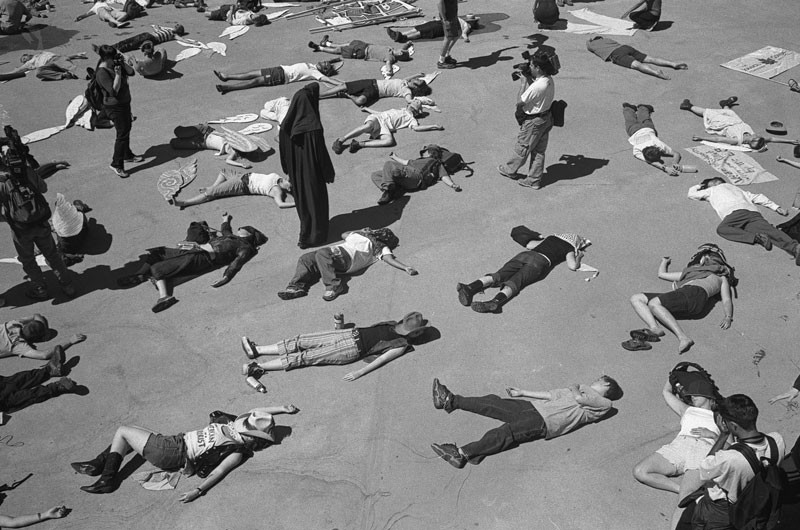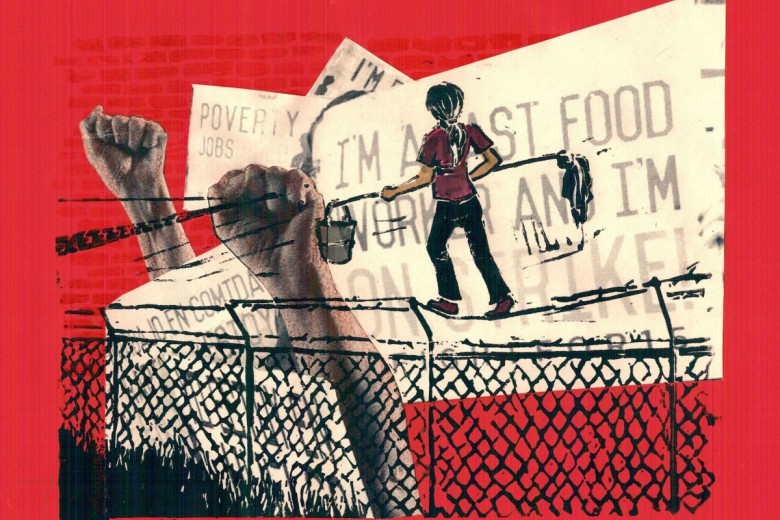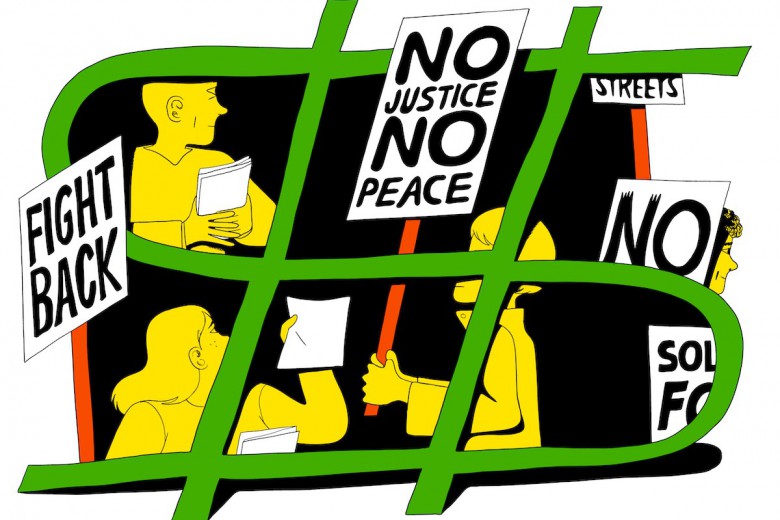
Ever since tens of thousands of people converged on the streets of Seattle and successfully shut down the World Trade Organization in November 1999, convergences have been the tactic of choice for confronting global capitalism. It is no surprise, then, that those who see the upcoming Olympics in Vancouver as one more attempt by state and corporate elites to expand their own interests at the expense of the general population have called for a convergence from February 10 to 15, 2010.
Organizers have been working steadily towards the event for over two years, and have called for activists from across the country and around the world to descend on the Vancouver area to express their opposition to the social and environmental havoc wreaked by the Games. The convergence will consist of a two-day popular education conference followed by four days of action, focusing on the specific themes of indigenous peoples, land, poverty, women and the security crackdown on civil liberties. Countering the “corporate circus” of the Games with the spectacle of mass resistance, organizers hope to pack the streets with people engaging in diverse yet coordinated actions, disrupting the Games and sending a message of dissent to the world. But beyond this expression of dissent, what do activists actually hope to achieve with this tactic?
Organizers with the global justice movement have levelled substantial critiques of precisely this kind of mass protest, questioning both its effectiveness at achieving real change and its potential to distract or detract from more locally rooted organizing efforts. Those engaging in anti-Olympics resistance have had to grapple with difficult questions about the usefulness of convergences and consider whether the tactic can be modified to address both the concerns that have been raised and the specific circumstances of the event and the host community. Activists’ success or failure in dealing with these concerns in Vancouver will have significant implications for future organizing in the city, as well as the future of convergences as a tactic.
The rise and fall (and rise?) of convergences
Now emblematic of the heyday of the antiglobalization movement on the continent, Seattle saw the co-operation of labour groups, anarchists, NGOs, church groups and others in organizing a days-long gathering of resistance involving popular education, independent media training and an array of street actions ranging from marches to strikes to militant direct actions.
While mass demonstrations were nothing new, Seattle ushered in a new wave of mass protests in North America and beyond. Nearly every meeting of global political and financial elites over the past decade — the summits of the WTO, IMF, G8 and World Bank, in addition to numerous free trade agreements — has been met with resistance that organized itself according to the convergence model. For many, these convergences are celebrations of creative resistance and solidarity, direct threats to the state and corporate purveyors of global domination, and the primary voice of the antiglobalization movement.
However, such convergences have seen decreasing numbers of participants in recent years, as states increasingly win both the tactical and the public-relations battles.
Many explain the decreasing numbers seen at more recent convergences as one of the realities of organizing in the heightened security climate of the post-9/11 years. However, the antiglobalization movement had been demonized in the media from the start, with decontextualized coverage of the militant tactics of the black bloc in Seattle dominating mainstream coverage of the event. Likewise, intense state repression is nothing new for antiglobalization organizers, as thousands who braved the tear gas and rubber bullets saw in Quebec City in early 2001.
Indeed, the waning of the convergence model can be explained at least as much by activists’ own frustrations with the tactic as with state repression. With so much organizing effort directed at coordinating large one-off protests, convergences have increasingly been criticized for distracting from day-to-day, on-the-ground struggles that have more potential to achieve concrete gains. And while activists engaging in summit-hopping — the practice of following the world’s political and economic elite from global gathering to global gathering — saw themselves as contributing to anti-globalization solidarity, they generally remained detached from, or in some cases served only to alienate, the local communities in which they acted. The fact that summit-hopping is costly and time-consuming almost guaranteed that the activists that engaged in it had relative privilege, isolating them from those most affected by globalization’s ills.
As activists Manuel Pastor and Tony LoPresti aptly noted in an article in ColorLines magazine, convergence protesters could be found “swooping into town for the action, then departing, with the local community serving as a mere stage for the Kabuki play of protest and repression” (“Bringing globalization home” June 2004). For critics both inside and outside the movement, convergences are little more than riot porn for activists seeking thrills, and have served neither to advance struggles against capitalism or other systems of domination, nor to win concrete gains in people’s lives.
Why, then, proceed with a convergence in Vancouver?
Global spectacle, local debacle
One of the most cogent challenges facing the antiglobalization movement in general, and the convergence tactic in particular, has been the difficulty of connecting the day-to-day issues of local communities to broader analyses of systems of global domination. With the Olympics, these connections have proven easier to make. Although the Olympics are a global phenomenon, the exploitation and marginalization that inevitably accompany them are rooted within an intimate and local context: global spectacle, local debacle. Anti-Olympics organizers have recognized that this connection between the global and the local has opened up opportunities for a convergence model more grounded in ongoing local struggles.
For many people who would have seen decisions made at meetings of the IMF, G8 or WTO as irrelevant to their daily lives, the anti-Olympics convergence has the potential to forge an explicit and real connection between global forces and local struggles. While the effects of the decisions made at global summits are dispersed in time and space and are not strongly connected to the communities in which the summit meetings occur, the impact of the Olympics on poor communities and nearby ecosystems is immediate and direct.
With nothing but broken promises of social housing hanging over East Hastings in Vancouver’s infamous downtown eastside, the fact that developers and the business lobby have shamelessly exploited the Olympics to their own advantage is widely recognized. New luxury developments have meant that rents have skyrocketed across the city, and critics have estimated that 1,150 units of low income housing have been lost in the years since Vancouver made its Olympics bid. At the same time that the numbers of homeless and impoverished populations have swelled, crackdowns on city bylaws have meant the de facto criminalization of poverty in an attempt to “clean up” the city in the lead-up to the Games. The Assistance to Shelter Act is the most recent in a series of policies that could be used to force the homeless off the streets and into temporary shelters, where the true social legacy of the Olympics will be invisible to international media. Public spending on Games-related infrastructure and venues is expected to reach up to $6 billion, leaving public debt as one of the more likely enduring legacies of the Olympics for local residents. (The province of Quebec only paid off its “Big Owe” 1976 Olympic debt in 2006.) And as the city gears up for the largest peacetime security force ever seen on Canadian soil and attacks on civil liberties ranging from the surveillance of activists to the establishment of protest zones draw criticism from even more moderate corners, the impacts felt by local communities will only intensify as the Games draw near.
As Anna Hunter of the Anti-Poverty Committee and the Olympic Resistance Network points out, “there is such a large number of Vancouver citizens that oppose the Games, not because of some political motivation, but because it has disrupted their lives, cost them money and invaded their communities.” This groundswell of opposition is significant, especially considering the sheer popularity of the Games and the multi-million dollar marketing machine supporting the Olympics. It also presents activists with the opportunity to encourage broader understandings of and resistance to capitalism, colonialism and other systems of domination.
Perhaps more significantly, this grounding within the local context allows preparations for a convergence to occur within the context of, rather than as a distraction from, ongoing local organizing. What can be cast loosely as “anti-Olympics organizing” has in fact been part of the day-to-day work of a wide variety of groups — from anti-poverty groups protesting evictions and gentrification, to indigenous groups as part of their centuries-long struggle against colonialism, to migrant justice organizers supporting the temporary workers engaged in building the venues and related infrastructure, to environmentalists resisting highway expansion. The quite literal convergence of these day-to-day struggles into a single, coordinated mass protest presents an opportunity for solidarity among multiple sectors that can serve as rich fertilizer for ongoing organizing in the city.
Resisting the Olympics has become intertwined with a variety of issues such that, for many activists, it is no longer just about opposing a one-time event. According to Harjap Grewal, an organizer with No One Is Illegal Vancouver and the Olympic Resistance Network, anti-Olympics organizing has in many ways strengthened rather than distracted from ongoing organizing. “It actually can add momentum, visibility, resources and energy to organizing already happening in the city and across the country” he said.
According to Chris Shaw, author of the book Five Ring Circus: Myths and Realities of the Olympic Games and long-time street medic at antiglobalization protests, the public, performative nature of the Games also makes them particularly vulnerable to protest in ways that other global gatherings are not. “All those financial meetings have become very adept at going to places like Qatar where you couldn’t get to. And what are you going to do in Qatar? The answer is not much. But if we can force the Olympics into that sort of thing, where they have to have their meetings in places where no one can get to, it destroys the entire machinery of the Olympics. How can you put tourists there and not protesters?”
This is not to suggest that a convergence in Vancouver does not have significant limitations as a tactic. Even if the Olympics were substantially disrupted, or even stopped through a convergence, the damage to the city and region is largely already done, with low-income housing demolished, unceded and ecologically sensitive land developed and surveillance and security measures already implemented. Whatever demands the organizers might hope to make, then, are largely moot by the time the Games actually take place. The best that convergence organizers can hope to achieve in this regard is to make a statement to the rest of the world, making it more difficult for the International Olympic Committee to stage Games in the future. In this sense, the benefits of an anti-Olympics convergence will largely accrue to future host cities (or those that manage to avoid becoming host cities), rather than to the local community.
Civil-liberty-threatening security and surveillance measures are a particularly troubling side effect of the locally rooted nature of convergence planning. While using large events like the Olympics to justify the implementation of security mechanisms is nothing new, the fact that the day-to-day activities of organizers are strongly connected to planning a convergence means that ongoing activities are now also subject to surveillance. This may have longer-term consequences for organizers in Vancouver, as the state mechanisms available to monitor and suppress dissent get stronger.
When the music’s over
After the Games are over, convergence organizers will face the challenge of using the momentum generated by the convergence to engage the local community and make concrete demands in responding to the mess they leave behind. While the willingness of the state to respond to most activist demands remains doubtful, there is some potential for this kind of mass mobilization to achieve real gains.
For instance, a groundswell of public outcry and threats of legal action prompted the modification of a draconian Vancouver bylaw in late November. This was a significant win for anti-Olympics organizers, as the bylaw would have severely restricted free speech and peaceful protest for the three-week period of the Games and set a dangerous precedent for similar future legislation. Other demands of the Canadian state, sponsor corporations or the International Olympics Committee are less explicit or well-developed, and this may be one significant limitation for using the momentum of a convergence to strategically advance the aims of the movement.
Some activists, however, see convergence as a creative, oppositional tactic not dependent on making demands of dominating forces. Indeed, the spirit of convergences has always been one of building more democratic alternatives rooted in people — rather than state or corporate — power. While the goals of the convergence certainly include a significant disruption or shutdown of the Games that could mount an effective challenge to the institution, this is only one part of the picture. By building on the geographical rootedness of the anti-Olympics struggle, there is hope that the alternative expressed within a convergence can extend beyond the five days of protest and will serve to strengthen local social movements.
No Olympics on stolen land
Realizing this potential of convergences to truly build a rooted solidarity will largely depend on organizers’ ability to overcome the exclusions that have marked previous mass protests. Despite the fact that people of colour bear the brunt of globalization’s ills, the face of antiglobalization convergences has historically remained predominantly white. Overcoming this (perhaps unintentional) racist exclusion of people of colour from convergence organizing and protest has been a major goal of anti-Olympics organizers.
One of the more substantial shifts in organizers’ approach has been an explicit recognition that the Olympics, and any accompanying resistance, is taking place on unceded native land, and that this consideration should be central when considering the approaches and issues tackled within an anti-Olympics convergence.
“The convergence call of “˜No Olympics on Stolen Land’ is unprecedented in bringing to the forefront the recognition of Indigenous self-determination” notes Harsha Walia, project coordinator at the Downtown Eastside Women’s Centre and an organizer with No One is Illegal Vancouver and the Olympic Resistance Network. “Rather than being treated as one of many issues, it creates the necessary anti-colonial foundation which has often been missing in previous mega-protests.”
This effort to root the protest in an anti-colonial framework represents a substantial shift not only in what is being talked about, but also who is doing the talking. Indeed, the anti-colonial focus came from the strength of native people organizing rather than any benevolence on the part of white organizers. Members of the Secwepemc and St’at’imc nations filed their official opposition to the Vancouver Games bid with the International Olympic Committee in 2002, long before the Olympics was on the mind of most other activists in the area. The convergence planned for February 2010, to a large extent, builds off the call made at an Intercontinental Indigenous Peoples’ Gathering in Sonora, Mexico, in 2007, where connections were drawn between resistance to the Olympics and ongoing resistance to colonialism across the continent.
The rooting of the movement in aboriginal demands for self-determination, rather than their mere inclusion within a set of priorities defined by non-natives, represents an important evolution in convergence organizing that has the potential to foster greater solidarity among natives and non-natives.
Unfortunately, putting this potential into practice has sometimes proven more difficult. As Walia explains, “At times it has led the movement to become paralyzed in a search for (often tokenized) Native leaders, feeling stuck in the dynamic of “˜conflicting opinions’ (as if Indigenous people are supposed to be a homogeneous group!), or the placing of an unrealistic and inappropriate burden for directing the movement on Indigenous people struggling just to survive. It is kind of the Leftist version of the white man’s burden.”
The need for non-natives to share the work of organizing the anti-Olympics convergence is particularly evident given the nearly $1 billion in security measures in place for the Games. While critics and activists of all races have faced harassment and intimidation by security officials in the months leading up to the Games, natives and other racialized individuals are likely to be the disproportionate victims of security and surveillance mechanisms. This presents a substantial barrier to participation in a convergence protest for many people of colour, and presents a particular responsibility for those who are involved to stay true to their commitments to support those most at risk.
Despite these tensions, there is nevertheless some hope that the anti-colonial foundation of the convergence will resonate in other cities and with future organizing efforts.
The future of convergences
If plans for the anti-Olympics convergence in Vancouver suggest anything, it is that the commonly repeated (though just as often ignored) refrain of “not using cookie-cutter tactics” does not imply that activists should simply throw out tactics that have been problematic in the past. The 2010 Olympics has presented organizers with the opportunity to adjust the convergence model in ways that address concerns.
“People say that convergences aren’t valuable, that we need to do something else, that it’s deflating, or it can’t be effective” notes Grewal. “We could be fixing and improving things. Who is missing? What are the tactics we haven’t been using? As we address those things, convergences could keep having an impact.”
The anti-Olympics convergence has attracted interest precisely because it has taken a tactic known for being disconnected from communities and made it locally relevant, responsive to the demands of colonized people, and tactically attuned to the opportunities that convergence activism presents. In many ways, the plans for an anti-Olympics convergence have made use of the most effective elements of past convergences — the spirit of creativity and solidarity — to build a more grounded and more useful application of the tactic.
This reimagining of the convergence model will only become more essential as the opportunities for resistance multiply. “We’re not only going to be converging at the G8 and WTO anymore” Grewal says. “We’re recognizing that systems of global domination and capitalism and colonization are rooted in these celebrations as well, these spectacles of sport.”
The success of the anti-Olympics convergence remains to be seen, but one thing is certain: the convergence will not be judged exclusively by its success at disrupting the Games as a one-time event.
“Ultimately, our resistance over the last three years, and during the Olympics, will influence the next phase of resistance” says Gord Hill, a member of the Kwakwaka’wakw people and editor of No2010.com and WarriorPublications.com. “The post-Olympic scenario contains all the potential for greater social conflict.”
With the exacerbation of poverty from the Games and the public sector cuts and job losses that are likely as a result of massive government deficits, one can only hope that social movements will be up for the challenges — and opportunities — that the post-Olympic period presents. The legacy of an anti-Olympics convergence will ultimately be determined by its success at strengthening local movements — that is, by the relationships built and the people meaningfully engaged in the organizing.



_780_520_90_s_c1.jpg)


